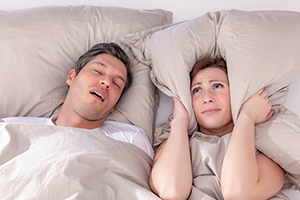 Do you sometimes feel like your heart flip-flops or even skips a beat here and there? Do you get lightheaded and begin to gasp for air?
Do you sometimes feel like your heart flip-flops or even skips a beat here and there? Do you get lightheaded and begin to gasp for air?
Now, do you snore?
These unrelated questions may actually be leading you to discover a condition that increases your stroke risk fivefold.
Fortunately, you can easily avoid this if you take action soon enough.
Atrial fibrillation occurs when the two upper chambers of your heart beat irregularly and out of rhythm with the two bottom chambers.
It increases your risk of stroke 500%.
If you have it, you will feel heart palpitations, weakness, shortness of breath, dizziness, and occasionally chest pains.
Many people don’t even know that they have it, because the symptoms come and go and people usually pay attention to a heart problem only when it doesn’t go away.
There is often a direct trigger for atrial fibrillation. So, if identified right, the solution may be as simple as cutting down on coffee or stress. Although doctors often temporarily use medication or electrical cardioversion.
Now sleep apnea has been discovered as a strong trigger.
23 people who needed electrical cardioversion at the University Hospital of Umeå were offered tests for sleep apnea.
None of them had been diagnosed with sleep apnea before. But when tested, incredibly, over 80% of patients with atrial fibrillation also had sleep apnea.
Since they checked for sleep apnea before and after the electrical cardioversion therapy, they also found that this therapy did not remedy the patient’s sleep apnea.
Making us think that it’s sleep apnea that causes atrial fibrillation, not the other way around.
So, common sense tells us that by treating your sleep apnea, you should be able to reverse atrial fibrillation naturally, without medications.
The only way to cure (not just treat) snoring and sleep apnea is using simple exercises to strengthen the muscles around your breathing passages. This will keep your throat open throughout the night, therefore avoiding the dreadful choking episodes.

 Overcoming IBD
Overcoming IBD Multiple Sclerosis
Multiple Sclerosis Banishing Bronchitis
Banishing Bronchitis Gum Disease Gone
Gum Disease Gone Overcoming Onychomycosis
Overcoming Onychomycosis Neuropathy No More
Neuropathy No More The Prostate Protocol
The Prostate Protocol Brain Booster
Brain Booster
 Ironbound
Ironbound
 Solution for Shingles
Solution for Shingles
 The Bone Density Solution
The Bone Density Solution
 The Ultimate Healing Protocol
The Ultimate Healing Protocol
 The Parkinson's Protocol
The Parkinson's Protocol
 The Chronic Kidney Disease Solution
The Chronic Kidney Disease Solution
 Overthrowing Anxiety
Overthrowing Anxiety The Fatty Liver Solution
The Fatty Liver Solution The Hypothyroidism Solution
The Hypothyroidism Solution
 The End of Gout
The End of Gout The Blood Pressure Program
The Blood Pressure Program
 The Oxigized Cholesterol Strategy
The Oxigized Cholesterol Strategy
 Stop Snoring And Sleep Apnea Program
Stop Snoring And Sleep Apnea Program
 The Arthritis Strategy
The Arthritis Strategy The Vertigo & Dizziness Program
The Vertigo & Dizziness Program The 3-Step Diabetes Strategy
The 3-Step Diabetes Strategy Hemorrhoids Healing Protocol
Hemorrhoids Healing Protocol The Erectile Dysfunction Master
The Erectile Dysfunction Master Weight Loss Breeze
Weight Loss Breeze The IBS Program
The IBS Program The Insomnia Program
The Insomnia Program The Migraine and Headache Program
The Migraine and Headache Program The Neck Pain Solution
The Neck Pain Solution The Menopause Solution
The Menopause Solution The Ejaculation Master
The Ejaculation Master The TMJ Solution
The TMJ Solution The Acid Reflux Solution
The Acid Reflux Solution The Fibromyalgia Solution
The Fibromyalgia Solution The Psoriasis Strategy
The Psoriasis Strategy